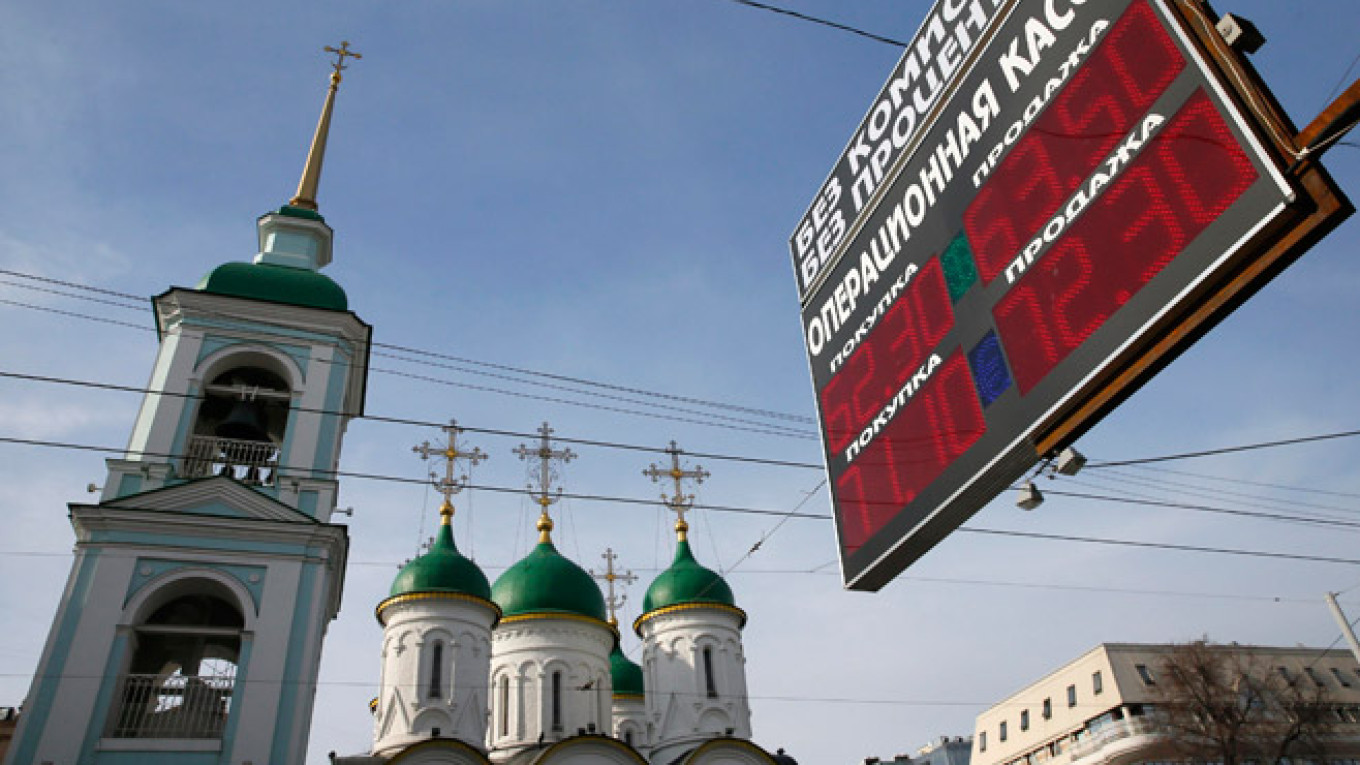The Russian ruble has recorded its biggest monthly gain since the early 1990s amid higher oil prices, an easing of the fighting in eastern Ukraine and a less intensive foreign debt repayment schedule as it claws back some of the losses it sustained during panic on currency markets last year.
The ruble climbed 11.5 percent in February to 61.7 against the U.S. dollar. That is the biggest monthly gain for over 20 years, business daily Vedomosti reported Friday citing Bloomberg data.
Over the same period the ruble rose by 13.2 percent to 69 versus the euro.
The rebound comes after the ruble lost about 40 percent of its value against the dollar last year amid dramatic volatility that peaked in December. The ruble dropped another 18.7 percent against the dollar in January.
The apparent stabilization of the currency has dispelled some predictions that the Russian economy is imploding, but experts caution against expectations of the ruble’s return to its early 2014 value, believing that the Russian government backs a weaker currency that is helping offset the impact of low energy prices on state income.
A steady rise in oil prices has underwritten the ruble rebound, with benchmark Brent crude making February its first month of gains since July. Now trading at just over $60 a barrel, oil dropped precipitously in the second half of last year from highs of $115 a barrel in June.
“An improvement in the geopolitical situation,” has been another key factor in steadying the ruble, according to Alexei Devyatov, chief economist at UralSib Capital in Moscow.
The ruble reacted positively after the leaders of France, Germany, Ukraine and Russia oversaw a cease-fire agreement in Minsk on Feb. 12 between Russian-backed separatists and Kiev, gaining 3 percent against the dollar in the two days after the signing of the deal.
The currency has continued to strengthen as falling levels of violence in eastern Ukraine makes the threat of further sanctions on Russia by Western countries more unlikely.
“For now we view the risk of further sanctions as very low,” currency analysts at Sberbank CIB wrote in a note to investors Friday.
The exchange rate has also been aided by lack of external debt payment deadlines for Russian companies — last year these peaked in December as firms were forced to pay off loans that could not be rolled over due to Western sanctions that block access to U.S. and European Union capital markets.
“Payment of external debts was one of the factors that caused the collapse of the ruble [in December] … in January and February there were fewer payments and pressure on the ruble decreased,” Devyatov said.
Russian exporters sold large amounts of foreign currency in February, helping to buoy the ruble, business daily Vedomosti reported Friday. In December, the government ordered five large state-owned companies — including gas giant Gazprom, oil major Rosneft and diamond producer Alrosa — to reduce their holdings of foreign currency to the levels of Oct. 1 by the first day of March.
“Mandatory currency sales by corporates were the main movers all the way down to 59.50 [against the dollar],” according to Aram Kazaryan, a senior currency trader at MDM Bank in Moscow.
The ruble dipped below 60 against the dollar Thursday for the first time since August.
But experts remain cautious over the future of the currency. External debt payments for Russian companies are due to rise again in March and both the higher oil price and the cease-fire in Ukraine appear fragile.
There is also an awareness that the Kremlin is happy with a depreciated ruble — and that the monetary authorities are unlikely to take any steps to push the currency back to 2014 levels.
While a weaker exchange rate fuels inflation, it also offsets lower oil prices and reduces the necessity for cuts to public spending. While a $1 drop in the price of oil deprives the budget of about 80 billion rubles ($2.1 billion) per year, a 1 ruble increase in the dollar exchange rate boosts income by about 200 billion rubles.
“There is growing recognition among market participants both outside and inside Russia that Russian authorities have strong preference for weaker ruble,” Deutsche Bank said in a note to investors Friday.
Contact the author at h.amos@imedia.ru
A Message from The Moscow Times:
Dear readers,
We are facing unprecedented challenges. Russia's Prosecutor General's Office has designated The Moscow Times as an "undesirable" organization, criminalizing our work and putting our staff at risk of prosecution. This follows our earlier unjust labeling as a "foreign agent."
These actions are direct attempts to silence independent journalism in Russia. The authorities claim our work "discredits the decisions of the Russian leadership." We see things differently: we strive to provide accurate, unbiased reporting on Russia.
We, the journalists of The Moscow Times, refuse to be silenced. But to continue our work, we need your help.
Your support, no matter how small, makes a world of difference. If you can, please support us monthly starting from just $2. It's quick to set up, and every contribution makes a significant impact.
By supporting The Moscow Times, you're defending open, independent journalism in the face of repression. Thank you for standing with us.
Remind me later.


